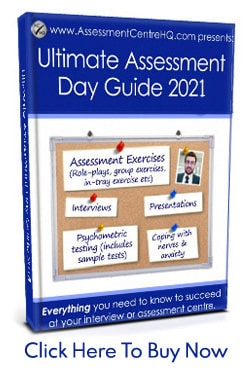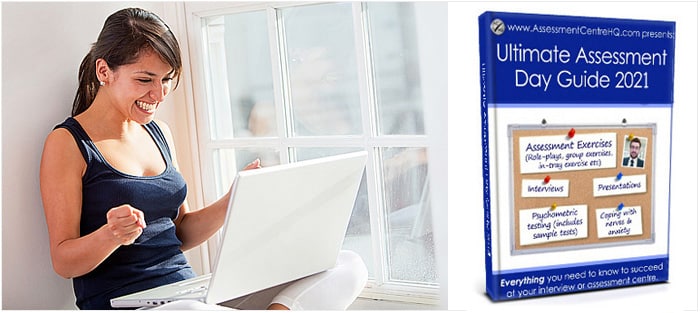How to Prepare for Numeracy Skills Test (QTS) – The Ultimate Guide
This success guide for the Qualified Teacher Status or QTS Numeracy Skills Test will tell you what to expect and help you prepare and do well for it.

Table of Contents
2 Useful Starting-point Resources
- Like in many exams, the secret to passing the QTS numeracy skills test is simply lots and lots of practice. You can get hold of practice QTS numeracy tests here.
- You should definitely check out our numerical reasoning hub. It covers everything you need to prepare for a numerical reasoning test.
Download our Ultimate Assessment Day & Interview Guide 2022 here. (It's packed with tips, tricks and insider-secrets to help you succeed.)
The Basics
The numeracy skills test worries all aspiring teachers, but this part of the professional skills test can easily be negotiated with the right preparation. Let’s look at the basics first.
What Is the Numeracy Skills Test?

The test is designed to assess a core skill that all teachers need to work with competence (it does not assess a specific subject knowledge).
The numeracy skills test checks that you have strong and broad numeracy skills, regardless of what subject you may intend to specialise in.
Why Is the Numeracy Skills Test So Important?
It is pretty simple: You cannot progress from trainee teacher status unless this test is passed. Once you have it under your belt, you can proceed toward qualified teacher status.
Where Do I Take the Numeracy Skills Test?
You will take your numeracy skills test at one of Learn Direct’s test centres, which are dotted all over the UK.
- Want to find your nearest centre? Click here.
- Want to book your numeracy skills test? You can do that here.
Numeracy Skills Test – The Specifics
You will have 48 minutes to complete your numeracy skills test. It’s broken down into two sections:
- Mental Arithmetic
- Written Arithmetic and Data
Let’s take a look at both sections in more detail.
The 4 Steps to Numerical Test Success – Download a Copy of Our Popular 4-Step Report
This is a useful tool if you want to improve your proficiency in maths: Click here to download our popular report ‘the 4 steps to numerical test success’
Numeracy Skills Test – Mental Arithmetic

You will be assessed on your ability to carry out mental calculations. With this in mind, you cannot use a calculator.
The questions are individually timed, so it’s imperative that you make your calculations swiftly. While it measures mental calculations, you can actually use pen and paper for this section.
You should expect to be assessed in the following Maths areas:
- Four basic operations (addition, subtraction, multiplication and division)
- Time
- Fractions, decimals, and percentages
- Proportions
- Measurement (money, distance, area, and volume)
- Conversions
You will hear each question twice and you need to make your basic calculations and enter your correct answer into the computer within 18 seconds. It’s a tight timeframe and speed is key. (Remember that you are being measured against other aspiring teaching candidates)
How Can I Improve My Maths Skills?
This is a question we get asked often. It’s pretty simple, the best way to improve your skills is to practice, practice, practice. We always recommend these practice tests for test takers because they benefit the candidate in two ways:
1) You will be familiar with the test format, which increases both your competence AND confidence. This will help you relax on the day and that is very important in boosting your test performance.
2) The tests above also include explanations for each question. The tests allow you to identify your weaknesses and help you improve.
Practice, practice, practice. (Do it for half an hour a day for the 2 weeks leading up to your numeracy skills test and you will sail through.)
Numeracy Skills Test – Written and Data Section
You do not need your headphones (or other audio-related gadget) for this section of the numeracy skills test. All questions will be accessed on the computer screen. You have to answer 16 questions in 36 minutes.
This part of the test assesses you in the following areas:
- Identifying patterns and trends
- Comparing data and drawing conclusions
- Interpreting written numerical data
You can use a calculator for this part of the exam.

- Time
- Money
- Fractions, decimals, and percentages
- Ratio and proportion
- Measurements (e.g., distance and area)
- Conversions
- Mean, median, and mode
- Range
- Formulae
Expect to be provided with lots of visual information, such as tables, charts, and graphs. Expect some multiple-choice questions as well as direct-entry items, where you will be required to type in your answers.
Download a Copy of Our Popular 4-Step Report
Click here to download our popular report ‘the 4 steps to numerical test success’
How to Prepare for This Part of the Numeracy Skill Test
This part of the test is a standard numerical reasoning assessment. You can also check out our numerical reasoning hub to help you prepare.
5 Top Tips for Passing Your Numeracy Skills Test
- Practice, practice, practice. This is the fundamental point in your preparation. Practicing allows you to discover your strengths and weaknesses. This will allow you to identify the areas you need to concentrate on. It will also ensure you get faster in answering question, which is also an important skill in the numeracy skills examination. You can get hold of excellent QTS practice tests here.
- Don’t waste time examining useless data. This is a really practical tip. Always read the question before spending time analysing a table or graph. Using this strategy will allow you to quickly disregard data that is not required.
- Use a Numerical Reasoning Hub. A resource hub will help you in the test you are taking. Here are some numerical reasoning coaching videos.
- Keep an eye on the clock. Manage your time wisely. Move through them at pace. You will learn proper time management during test taking by diligently doing practice tests.
- Prepare. Don’t leave your preparation to the last minute. Do not cram. Use the time leading up to your test to your advantage. This will ensure that you have covered everything you need to cover and you come to the exam prepared and confident.
What Is the Pass Rate for the Numeracy Skills Test?
The current pass rate is 63% – that equates to getting 18 out of the 28 questions correct.
When Do I Learn My Numeracy Skills Test Score?
The numeracy skills examination is computer-based and also computer-marked, meaning that you will walk away from the test centre with a printed score. (There’s no certificate issued, so keep the record card safe for future reference.)
Brush Up on Your Times Tables
Make sure you have a firm understanding of your times tables. Check out this brilliant video for a refresher.
QTS Numeracy Skills Test Video
This is an excellent video from Julie Kevill (of Middlesex University)
Even More Useful Resources for Your Numeracy Skills Test
- The Hegarty Maths channel on YouTube is a good place to brush up on your skills. Check it out here.
- This Guardian article is a useful read: ‘How to pass the numeracy skills test: 10 top tips for trainee teachers‘
- Here are some useful numeracy skills examination practice questions: 1, 2, 3, 4
- The main Department for Education page on the numeracy skills examination is here.
Final Words
This comprehensive will help you with your upcoming NTS test. Make sure to spend ample time in your preparation. With the right mindset, strategy, and effort, you will come out on top and become one step closer to to teach kids in the country.
Turbocharge your employability NOW
Get your copy of our Ultimate Assessment Day & Interview Guide here. It's packed with tips, tricks and insider-secrets to help you succeed.
.
© Copyright AssessmentCentreHQ - All Rights Reserved
.
FAQs
1. What Is a Basic Numeracy Test?
Basic numeracy tests are used to evaluate a person’s ability to do basic arithmetic operations. This type of test evaluates your ability to perform addition, subtraction, multiplication, and division operations as well as logical reasoning. It is based on basic maths that is usually not more difficult than middle school levels.
2. How Can I Prepare for the Numeracy Skills Test?
There is no definitive way to prepare for the numeracy skills test. However, some tips to improve your score include practicing basic math skills regularly, focusing on problem-solving, and using practice tests to identify areas that need more work.
3. What Is the Difference Between Maths and Numeracy?
Maths is the study of numbers and their operations, while numeracy is the ability to use maths in practical situations. Numeracy might involve using maths to work out how much petrol is left in a tank, or how many days of holiday someone has left.
4. How Can I Learn Basic Math Skills?
There are a few different ways that you can learn basic math skills. One way is to take a class at a local community college or adult education center. Another way is to use a resource like Khan Academy, which offers online video tutorials that can help you review basic math concepts. Finally, you can also find practice problems and worksheets online or in books to help you strengthen your skills.
5. What Are Four Examples of Numeracy?
Numeracy is the ability to use numbers and mathematical concepts in order to solve problems. Some examples of numeracy include: adding and subtracting, multiplying and dividing, working with fractions and decimals, and solving equations. Numeracy is important in many different fields, including science, technology, engineering, and mathematics.
You May Also Like to Read :
Sarah is an accomplished educator, researcher and author in the field of testing and assessment. She has worked with various educational institutions and organisations to develop innovative evaluation methods and enhance student learning. Sarah has published numerous articles and books on assessment and learning. Her passion for promoting equity and fairness in the education system fuels her commitment to sharing insights and best practices with educators and policymakers around the world.










